- Home
- George Orwell
Homage to Catalonia Page 20
Homage to Catalonia Read online
Page 20
The Anarchist viewpoint is less easily defined. In any case the loose term 'Anarchists' is used to cover a multitude of people of very varying opinions. The huge block of unions making up the CNT (Confederacion Nacional del Trabajo), with round about two million members in all, had for its political organ the FAI (Federacion Anarquista Iberica), an actual Anarchist organization. But even the members of the FAI, though always tinged, as perhaps most Spaniards are, with the Anarchist philosophy, were not necessarily Anarchists in the purest sense. Especially since the beginning of the war they had moved more in the direction of ordinary Socialism, because circumstances had forced them to take part in centralized administration and even to break all their principles by entering the Government. Nevertheless they differed fundamentally from the Communists in so much that, like the POUM, they aimed at workers' control and not a parliamentary democracy. They accepted the POUM slogan: 'The war and the revolution are inseparable,' though they were less dogmatic about it. Roughly speaking, the CNT-FAI stood for: (1) Direct control over industry by the workers engaged in each industry, e.g. transport, the textile factories, etc.; (2) Government by local committees and resistance to all forms of centralized authoritarianism; (3) Uncompromising hostility to the bourgeoisie and the Church. The last point, though the least precise, was the most important. The Anarchists were the opposite of the majority of so-called revolutionaries in so much that though their principles were rather vague their hatred of privilege and injustice was perfectly genuine. Philosophically, Communism and Anarchism are poles apart. Practically - i.e. in the form of society aimed at - the difference is mainly one of emphasis, but it is quite irreconcilable. The Communist's emphasis is always on centralism and efficiency, the Anarchist's on liberty and equality. Anarchism is deeply rooted in Spain and is likely to outlive Communism when the Russian influence is withdrawn. During the first two months of the war it was the Anarchists more than anyone else who had saved the situation, and much later than this the Anarchist militia, in spite of their indiscipline, were notoriously the best fighters among the purely Spanish forces. From about February 1937 onwards the Anarchists and the POUM could to some extent be lumped together. If the Anarchists, the POUM and the Left wing of the Socialists had had the sense to combine at the start and press a realistic policy, the history of the war might have been different. But in the early period, when the revolutionary parties seemed to have the game in their hands, this was impossible. Between the Anarchists and the Socialists there were ancient jealousies, the POUM, as Marxists, were sceptical of Anarchism, while from the pure Anarchist standpoint the 'Trotskyism' of the POUM was not much preferable to the 'Stalinism' of the Communists. Nevertheless the Communist tactics tended to drive the two parties together. When the POUM joined in the disastrous fighting in Barcelona in May, it was mainly from an instinct to stand by the CNT, and later, when the POUM was suppressed, the Anarchists were the only people who dared to raise a voice in its defence.
So, roughly speaking, the alignment of forces was this. On the one side the CNT-FAI, the POUM, and a section of the Socialists, standing for workers' control: on the other side the Right-wing Socialists, Liberals, and Communists, standing for centralized government and a militarized army.
It is easy to see why, at this time, I preferred the Communist viewpoint to that of the POUM. The Communists had a definite practical policy, an obviously better policy from the point of view of the common sense which looks only a few months ahead. And certainly the day-to-day policy of the POUM, their propaganda and so forth, was unspeakably bad; it must have been so, or they would have been able to attract a bigger mass-following. What clinched everything was that the Communists - so it seemed to me - were getting on with the war while we and the Anarchists were standing still. This was the general feeling at the time. The Communists had gained power and a vast increase of membership partly by appealing to the middle classes against the revolutionaries, but partly also because they were the only people who looked capable of winning the war. The Russian arms and the magnificent defence of Madrid by troops mainly under Communist control had made the Communists the heroes of Spain. As someone put it, every Russian aeroplane that flew over our heads was Communist propaganda. The revolutionary purism of the POUM, though I saw its logic, seemed to me rather futile. After all, the one thing that mattered was to win the war.
Meanwhile there was the diabolical inter-party feud that was going on in the newspapers, in pamphlets, on posters, in books - everywhere. At this time the newspapers I saw most often were the POUM papers, La Battalla and Adelante, and their ceaseless carping against the 'counter-revolutionary' PSUC struck me as priggish and tiresome. Later, when I studied the PSUC and Communist press more closely, I realized that the POUM were almost blameless compared with their adversaries. Apart from anything else, they had much smaller opportunities. Unlike the Communists, they had no footing in any press outside their own country, and inside Spain they were at an immense disadvantage because the press censorship was mainly under Communist control, which meant that the POUM papers were liable to be suppressed or fined if they said anything damaging. It is also fair to the POUM to say that though they might preach endless sermons on revolution and quote Lenin ad nauseam, they did not usually indulge in personal libel. Also they kept their polemics mainly to newspaper articles. Their large coloured posters, designed for a wider public (posters are important in Spain, with its large illiterate population), did not attack rival parties, but were simply anti-Fascist or abstractly revolutionary; so were the songs the militiamen sang. The Communist attacks were quite a different matter. I shall have to deal with some of these later in this book. Here I can only give a brief indication of the Communist line of attack.
On the surface the quarrel between the Communists and the POUM was one of tactics. The POUM was for immediate revolution, the Communists not. So far so good; there was much to be said on both sides. Further, the Communists contended that the POUM propaganda divided and weakened the Government forces and thus endangered the war; again, though finally I do not agree, a good case could be made out for this. But here the peculiarity of Communist tactics came in. Tentatively at first, then more loudly, they began to assert that the POUM was splitting the Government forces not by bad judgment but by deliberate design. The POUM was declared to be no more than a gang of disguised Fascists, in the pay of Franco and Hitler, who were pressing a pseudo-revolutionary policy as a way of aiding the Fascist cause. The POUM was a 'Trotskyist' organization and 'Franco's Fifth Column'. This implied that scores of thousands of working-class people, including eight or ten thousand soldiers who were freezing in the front-line trenches and hundreds of foreigners who had come to Spain to fight against Fascism, often sacrificing their livelihood and their nationality by doing so, were simply traitors in the pay of the enemy. And this story was spread all over Spain by means of posters, etc., and repeated over and over in the Communist and pro-Communist press of the whole world. I could fill half a dozen books with quotations if I chose to collect them.
This, then, was what they were saying about us: we were Trotskyists, Fascists, traitors, murderers, cowards, spies, and so forth. I admit it was not pleasant, especially when one thought of some of the people who were responsible for it. It is not a nice thing to see a Spanish boy of fifteen carried down the line on a stretcher, with a dazed white face looking out from among the blankets, and to think of the sleek persons in London and Paris who are writing pamphlets to prove that this boy is a Fascist in disguise. One of the most horrible features of war is that all the war-propaganda, all the screaming and lies and hatred, comes invariably from people who are not fighting. The PSUC militiamen whom I knew in the line, the Communists from the International Brigade whom I met from time to time, never called me a Trotskyist or a traitor; they left that kind of thing to the journalists in the rear. The people who wrote pamphlets against us and vilified us in the newspapers all remained safe at home, or at worst in the newspaper offices of Valencia, hundreds of
miles from the bullets and the mud. And apart from the libels of the inter-party feud, all the usual war-stuff, the tub-thumping, the heroics, the vilification of the enemy - all these were done, as usual, by people who were not fighting and who in many cases would have run a hundred miles sooner than fight. One of the dreariest effects of this war has been to teach me that the Left-wing press is every bit as spurious and dishonest as that of the Right.* I do earnestly feel that on our side - the Government side - this war was different from ordinary, imperialistic wars; but from the nature of the war-propaganda you would never have guessed it. The fighting had barely started when the newspapers of the Right and Left dived simultaneously into the same cesspool of abuse. We all remember the Daily Mail's poster: 'REDS CRUCIFY NUNS,' while to the Daily Worker Franco's Foreign Legion was 'composed of murderers, white-slavers, dope-fiends and the offal of every European country.' As late as October 1937 the New Statesman was treating us to tales of Fascist barricades made of the bodies of living children (a most unhandy thing to make barricades with), and Mr Arthur Bryant was declaring that 'the sawing-off of a Conservative tradesman's legs' was 'a commonplace' in Loyalist Spain. The people who write that kind of stuff never fight; possibly they believe that to write it is a substitute for fighting. It is the same in all wars; the soldiers do the fighting, the journalists do the shouting, and no true patriot ever gets near a front-line trench, except on the briefest of propaganda-tours. Sometimes it is a comfort to me to think that the aeroplane is altering the conditions of war. Perhaps when the next great war comes we may see that sight unprecedented in all history, a jingo with a bullet-hole in him.
As far as the journalistic part of it went, this war was a racket like all other wars. But there was this difference, that whereas the journalists usually reserve their most murderous invective for the enemy, in this case, as time went on, the Communists and the POUM came to write more bitterly about one another than about the Fascists. Nevertheless at the time I could not bring myself to take it very seriously. The inter-party feud was annoying and even disgusting, but it appeared to me as a domestic squabble. I did not believe that it would alter anything or that there was any really irreconcilable difference of policy. I grasped that the Communists and Liberals had set their faces against allowing the revolution to go forward; I did not grasp that they might be capable of swinging it back.
There was a good reason for this. All this time I was at the front, and at the front the social and political atmosphere did not change. I had left Barcelona in early January and I did not go on leave till late April; and all this time - indeed, till later - in the strip of Aragon controlled by Anarchist and POUM troops, the same conditions persisted, at least outwardly. The revolutionary atmosphere remained as I had first known it. General and private, peasant and militiaman, still met as equals; everyone drew the same pay, wore the same clothes, ate the same food and called everyone else 'thou' and 'comrade'; there was no boss-class, no menial-class, no beggars, no prostitutes, no lawyers, no priests, no boot-licking, no cap-touching. I was breathing the air of equality, and I was simple enough to imagine that it existed all over Spain. I did not realize that more or less by chance I was isolated among the most revolutionary section of the Spanish working class.
So, when my more politically educated comrades told me that one could not take a purely military attitude towards the war, and that the choice lay between revolution and Fascism, I was inclined to laugh at them. On the whole I accepted the Communist viewpoint, which boiled down to saying: 'We can't talk of revolution till we've won the war,' and not the POUM viewpoint, which boiled down to saying: 'We must go forward or we shall go back.' When later on I decided that the POUM were right, or at any rate righter than the Communists, it was not altogether upon a point of theory. On paper the Communist case was a good one; the trouble was that their actual behaviour made it difficult to believe that they were advancing it in good faith. The often-repeated slogan: 'The war first and the revolution afterwards,' though devoutly believed in by the average PSUC militiaman, who honestly thought that the revolution could continue when the war had been won, was eyewash. The thing for which the Communists were working was not to postpone the Spanish revolution till a more suitable time, but to make sure that it never happened. This became more and more obvious as time went on, as power was twisted more and more out of working-class hands, and as more and more revolutionaries of every shade were flung into jail. Every move was made in the name of military necessity, because this pretext was, so to speak, ready-made, but the effect was to drive the workers back from an advantageous position and into a position in which, when the war was over, they would find it impossible to resist the reintroduction of capitalism. Please notice that I am saying nothing against the rank-and-file Communist, least of all against the thousands of Communists who died heroically round Madrid. But those were not the men who were directing party policy. As for the people higher up, it is inconceivable that they were not acting with their eyes open.
But, finally, the war was worth winning even if the revolution was lost. And in the end I came to doubt whether, in the long run, the Communist policy made for victory. Very few people seem to have reflected that a different policy might be appropriate at different periods of the war. The Anarchists probably saved the situation in the first two months, but they were incapable of organizing resistance beyond a certain point; the Communists probably saved the situation in October-December, but to win the war outright was a different matter. In England the Communist war-policy has been accepted without question, because very few criticisms of it have been allowed to get into print and because its general line - do away with revolutionary chaos, speed up production, militarize the army - sounds realistic and efficient. It is worth pointing out its inherent weakness.
In order to check every revolutionary tendency and make the war as much like an ordinary war as possible, it became necessary to throw away the strategic opportunities that actually existed. I have described how we were armed, or not armed, on the Aragon front. There is very little doubt that arms were deliberately withheld lest too many of them should get into the hands of the Anarchists, who would afterwards use them for a revolutionary purpose; consequently the big Aragon offensive which would have made Franco draw back from Bilbao, and possibly from Madrid, never happened. But this was comparatively a small matter. What was more important was that once the war had been narrowed down to a 'war for democracy' it became impossible to make any large-scale appeal for working-class aid abroad. If we face facts we must admit that the working class of the world has regarded the Spanish war with detachment. Tens of thousands of individuals came to fight, but the tens of millions behind them remained apathetic. During the first year of the war the entire British public is thought to have subscribed to various 'aid Spain' funds about a quarter of a million pounds - probably less than half of what they spend in a single week on going to the pictures. The way in which the working class in the democratic countries could really have helped her Spanish comrades was by industrial action - strikes and boycotts. No such thing ever even began to happen. The Labour and Communist leaders everywhere declared that it was unthinkable; and no doubt they were right, so long as they were also shouting at the tops of their voices that 'red' Spain was not 'red'. Since 1914-1918 'war for democracy' has had a sinister sound. For years past the Communists themselves had been teaching the militant workers in all countries that 'democracy' was a polite name for capitalism. To say first 'Democracy is a swindle', and then 'Fight for democracy!' is not good tactics. If, with the huge prestige of Soviet Russia behind them, they had appealed to the workers of the world in the name not of 'democratic Spain', but of 'revolutionary Spain', it is hard to believe that they would not have got a response.
But what was most important of all, with a non-revolutionary policy it was difficult, if not impossible, to strike at Franco's rear. By the summer of 1937 Franco was controlling a larger population than the Government - much larger, if one counts in the
colonies - with about the same number of troops. As everyone knows, with a hostile population at your back it is impossible to keep an army in the field without an equally large army to guard your communications, suppress sabotage, etc. Obviously, therefore, there was no real popular movement in Franco's rear. It was inconceivable that the people in his territory, at any rate the town-workers and the poorer peasants, liked or wanted Franco, but with every swing to the Right the Government's superiority became less apparent. What clinches everything is the case of Morocco. Why was there no rising in Morocco? Franco was trying to set up an infamous dictatorship, and the Moors actually preferred him to the Popular Front Government! The palpable truth is that no attempt was made to foment a rising in Morocco, because to do so would have meant putting a revolutionary construction on the war. The first necessity, to convince the Moors of the Government's good faith, would have been to proclaim Morocco liberated. And we can imagine how pleased the French would have been by that! The best strategic opportunity of the war was flung away in the vain hope of placating French and British capitalism. The whole tendency of the Communist policy was to reduce the war to an ordinary, non-revolutionary war in which the Government was heavily handicapped. For a war of that kind has got to be won by mechanical means, i.e. ultimately, by limitless supplies of weapons; and the Government's chief donor of weapons, the USSR, was at a great disadvantage, geographically, compared with Italy and Germany. Perhaps the POUM and Anarchist slogan: 'The war and the revolution are inseparable,' was less visionary than it sounds.
I have given my reasons for thinking that the Communist anti-revolutionary policy was mistaken, but so far as its effect upon the war goes I do not hope that my judgment is right. A thousand times I hope that it is wrong. I would wish to see this war won by any means whatever. And of course we cannot tell yet what may happen. The Government may swing to the Left again, the Moors may revolt of their own accord, England may decide to buy Italy out, the war may be won by straightforward military means - there is no knowing. I let the above opinions stand, and time will show how far I am right or wrong.

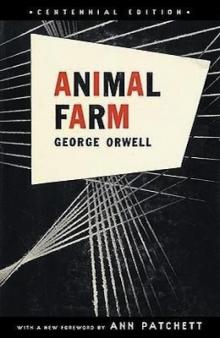 Animal Farm & 1984
Animal Farm & 1984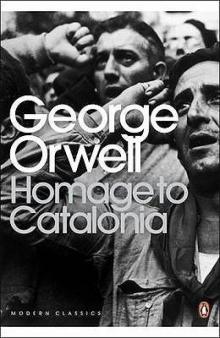 Homage to Catalonia
Homage to Catalonia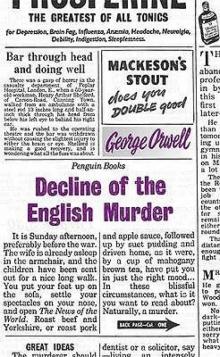 Decline of the English Murder
Decline of the English Murder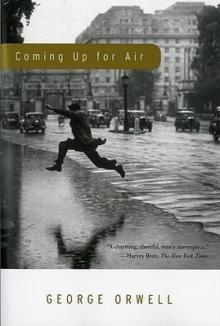 Coming Up for Air
Coming Up for Air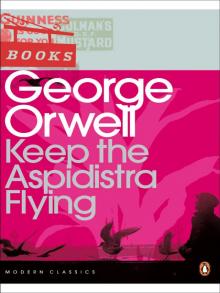 Keep the Aspidistra Flying
Keep the Aspidistra Flying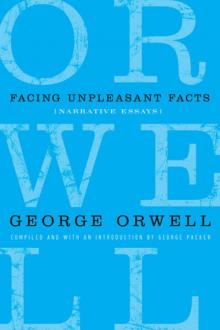 Facing Unpleasant Facts: Narrative Essays
Facing Unpleasant Facts: Narrative Essays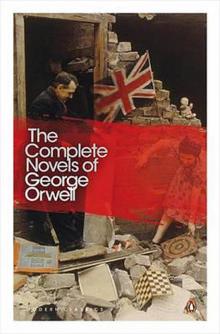 The Complete Novels of George Orwell
The Complete Novels of George Orwell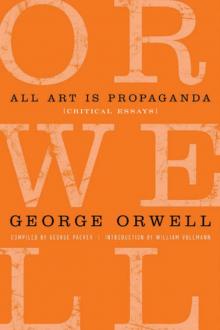 All Art Is Propaganda: Critical Essays
All Art Is Propaganda: Critical Essays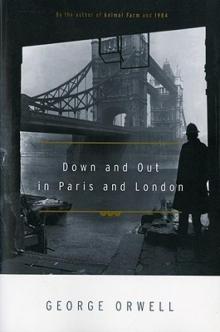 Down and Out in Paris and London
Down and Out in Paris and London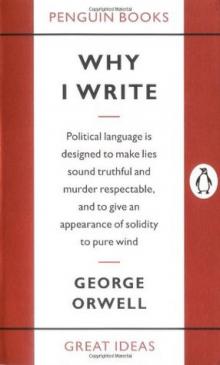 Why I Write
Why I Write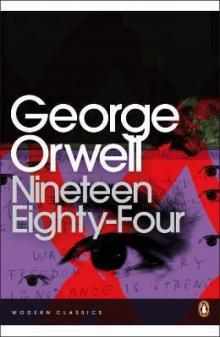 Nineteen Eighty-Four
Nineteen Eighty-Four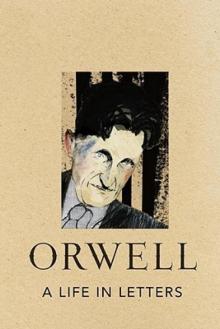 A Life in Letters
A Life in Letters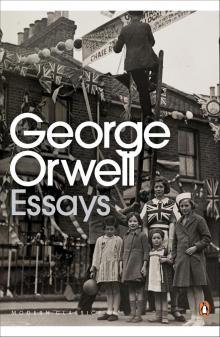 Essays
Essays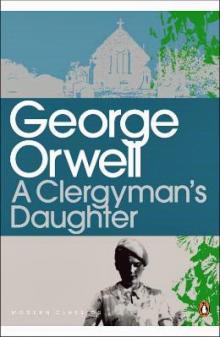 A Clergyman's Daughter
A Clergyman's Daughter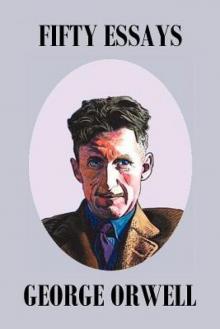 Fifty Orwell Essays
Fifty Orwell Essays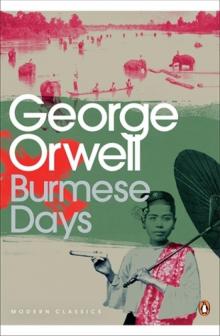 Burmese Days
Burmese Days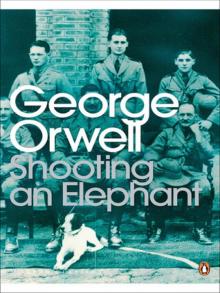 Shooting an Elephant
Shooting an Elephant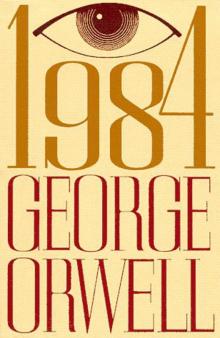 1984 (Penguin)
1984 (Penguin)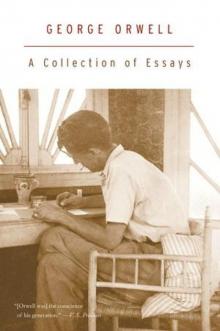 A Collection of Essays
A Collection of Essays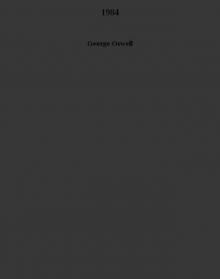 1984
1984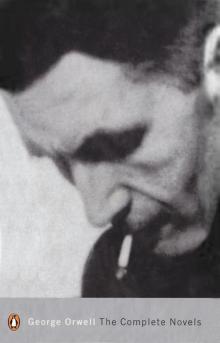 The Complete Novels
The Complete Novels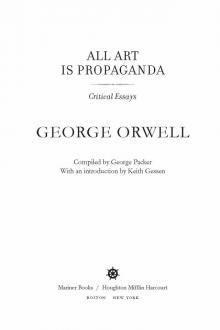 All Art Is Propaganda
All Art Is Propaganda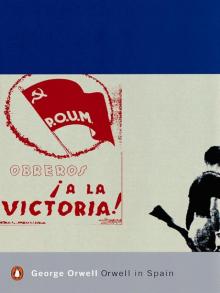 Orwell in Spain
Orwell in Spain Animal Farm: A Fairy Story
Animal Farm: A Fairy Story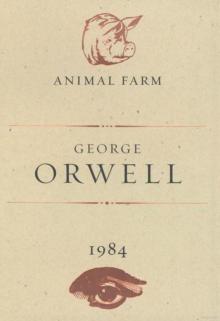 Animal Farm and 1984
Animal Farm and 1984